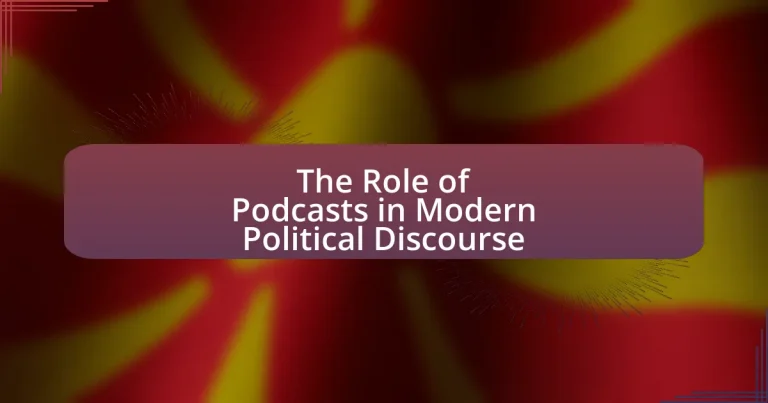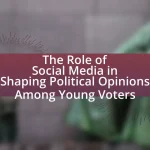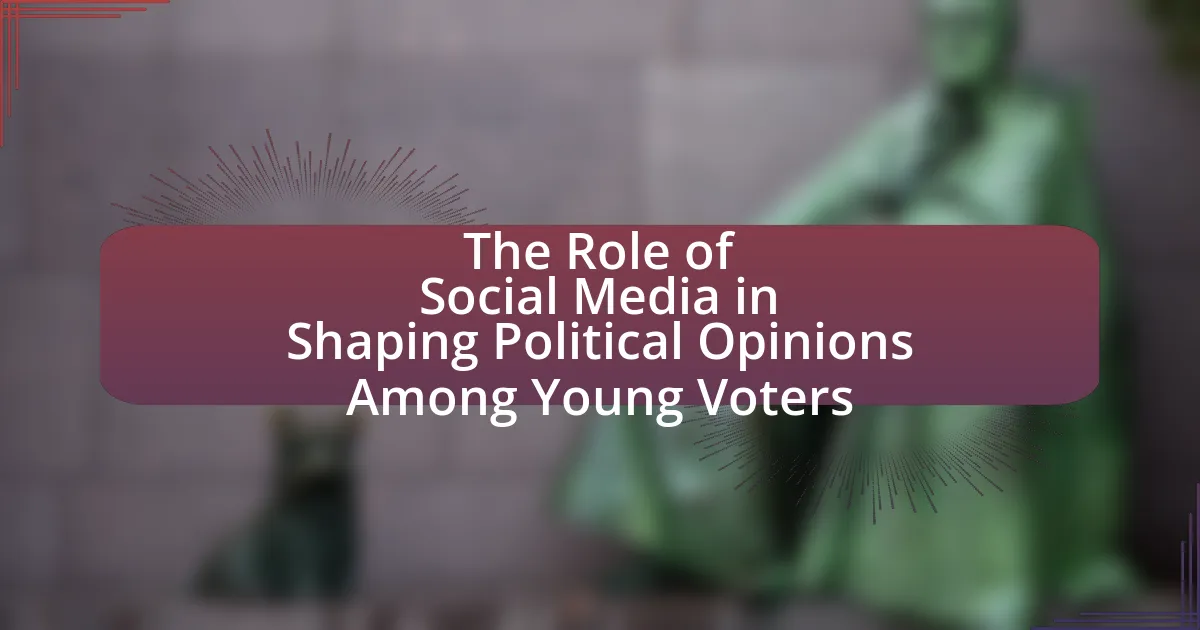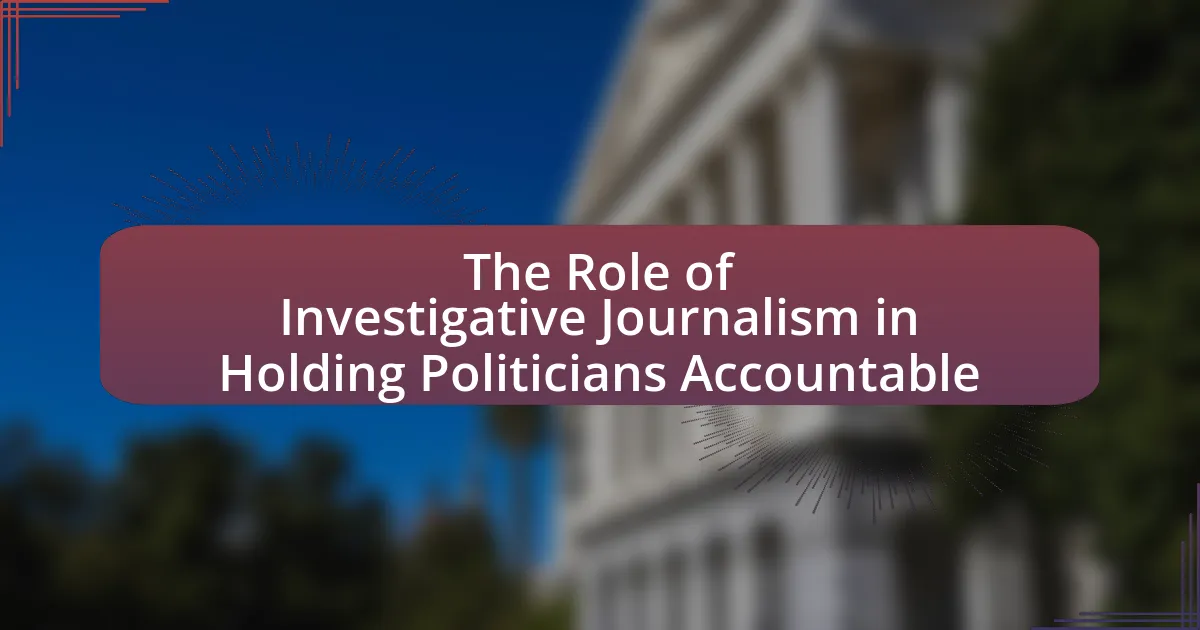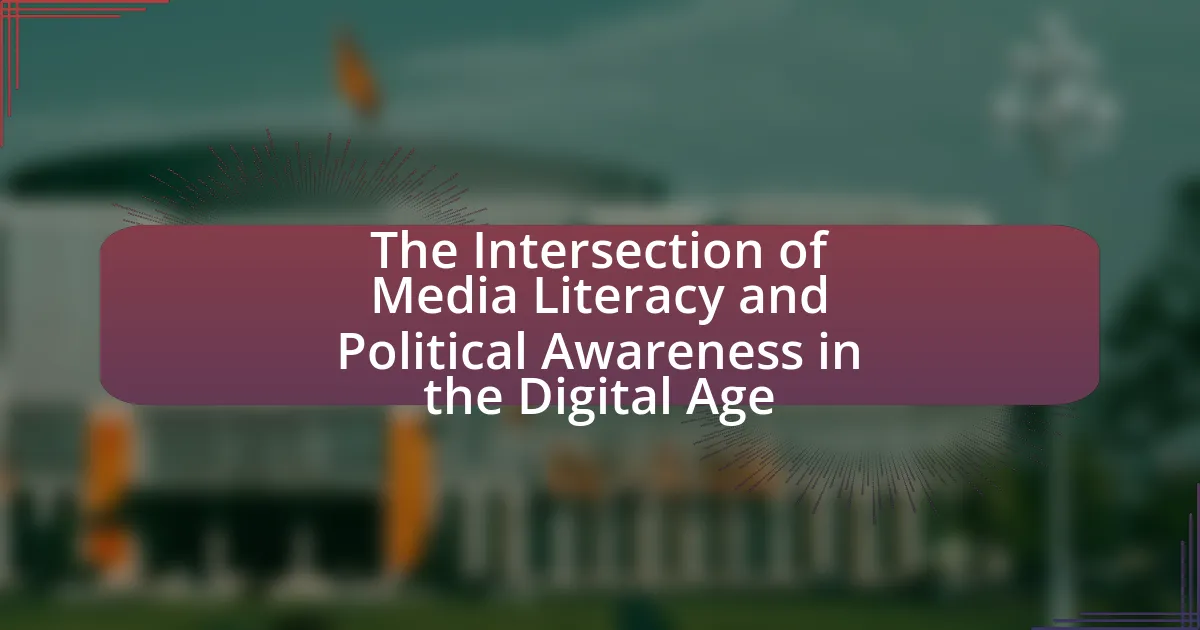Podcasts have emerged as a significant medium in modern political discourse, offering a platform for diverse voices and facilitating in-depth discussions on political issues. This article explores the evolution of podcasts as a political discussion medium, historical factors contributing to their rise, and the impact of technological advancements on accessibility. It examines how podcasts shape political opinions, engage younger audiences, and challenge mainstream media narratives while addressing challenges such as misinformation and audience polarization. Additionally, it provides strategies for listeners to critically engage with content and best practices for creators in producing political podcasts.
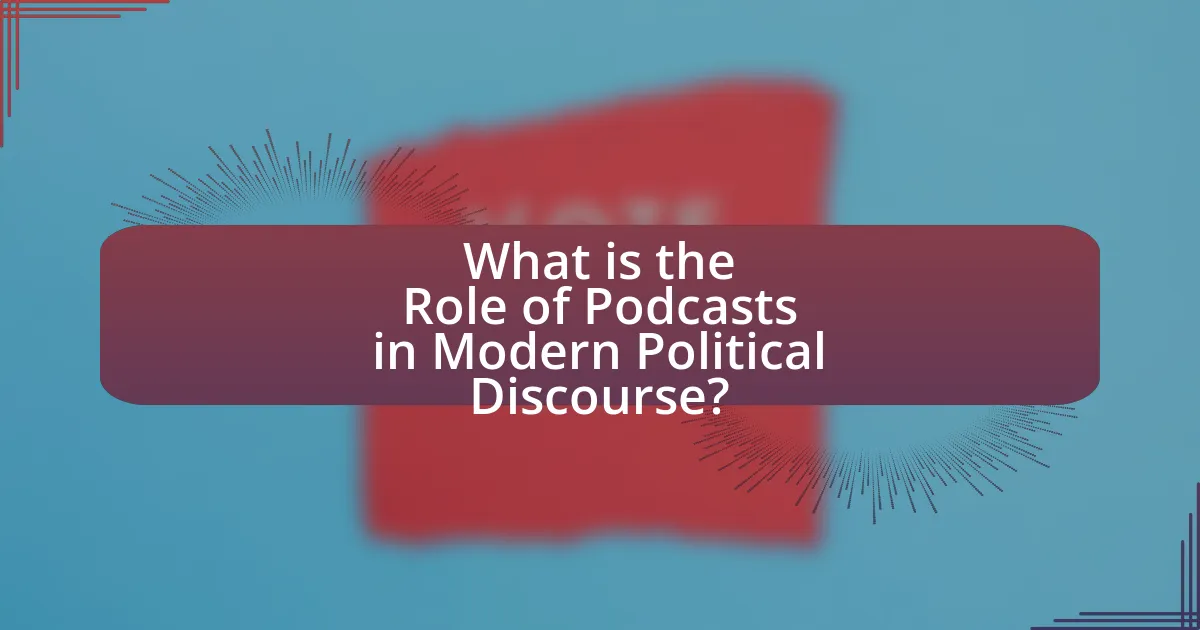
What is the Role of Podcasts in Modern Political Discourse?
Podcasts play a significant role in modern political discourse by providing a platform for diverse voices and facilitating in-depth discussions on political issues. They enable listeners to access a wide range of perspectives, often bypassing traditional media gatekeepers. According to a 2021 Pew Research Center study, 41% of Americans reported listening to podcasts, with political content being a popular genre, indicating a growing engagement with political topics through this medium. Additionally, podcasts allow for nuanced conversations that can explore complex issues in ways that shorter news segments cannot, fostering a more informed electorate.
How have podcasts evolved as a medium for political discussion?
Podcasts have evolved into a significant medium for political discussion by providing accessible platforms for diverse voices and viewpoints. Initially, podcasts were primarily used for entertainment, but their growth in popularity has led to a surge in political content, especially during election cycles and major political events. According to a 2020 report by Edison Research, 55% of podcast listeners engage with political content, reflecting a growing audience for political discourse. This evolution has been driven by the ability of podcasts to offer in-depth analysis, personal narratives, and informal discussions that traditional media often lacks, allowing for a more nuanced understanding of political issues. Furthermore, the rise of independent podcasters has democratized political commentary, enabling grassroots movements and marginalized voices to reach wider audiences, thereby reshaping the landscape of political communication.
What historical factors contributed to the rise of political podcasts?
The rise of political podcasts can be attributed to several historical factors, including the advent of the internet, the proliferation of mobile devices, and the decline of traditional media. The internet enabled easy access to information and diverse viewpoints, fostering a culture of on-demand content consumption. The widespread use of smartphones allowed users to listen to podcasts anytime and anywhere, significantly increasing their popularity. Additionally, the decline of traditional media outlets, such as newspapers and cable news, created a gap that podcasts filled by offering alternative perspectives and in-depth discussions on political issues. These factors collectively contributed to the growth of political podcasts as a significant medium for political discourse.
How do technological advancements influence podcast accessibility?
Technological advancements significantly enhance podcast accessibility by providing diverse platforms and tools for content creation and distribution. For instance, the proliferation of smartphones and high-speed internet has enabled users to access podcasts anytime and anywhere, increasing listener engagement. Additionally, advancements in audio editing software and hosting services simplify the production process, allowing more creators to enter the podcasting space. According to a 2021 report by Edison Research, 78% of Americans are aware of podcasting, indicating that improved technology has broadened the audience base. Furthermore, features like automatic transcription and translation services make podcasts more inclusive for individuals with hearing impairments or language barriers, further expanding accessibility.
Why are podcasts significant in shaping political opinions?
Podcasts are significant in shaping political opinions because they provide accessible platforms for diverse voices and in-depth discussions. This medium allows listeners to engage with complex political topics in a more personal and relatable format, often featuring expert interviews and grassroots perspectives. According to a 2020 Pew Research Center study, 41% of Americans reported that they had listened to a podcast, with political content being a popular genre. This widespread reach enables podcasts to influence public discourse and opinion formation, particularly among younger demographics who prefer audio content over traditional media.
What psychological effects do podcasts have on listeners’ political beliefs?
Podcasts significantly influence listeners’ political beliefs by shaping their perceptions and reinforcing existing biases. Research indicates that exposure to specific political content in podcasts can lead to increased polarization, as listeners often gravitate towards shows that align with their pre-existing views, thereby creating echo chambers. A study by the Pew Research Center found that 64% of podcast listeners reported that their views were reinforced by the content they consumed, highlighting the medium’s role in solidifying political identities. Additionally, the narrative style of podcasts can evoke emotional responses, making listeners more receptive to persuasive arguments, which further impacts their political beliefs.
How do podcasts facilitate political engagement among younger audiences?
Podcasts facilitate political engagement among younger audiences by providing accessible, diverse, and relatable content that resonates with their interests and values. This medium allows for in-depth discussions on political issues, often featuring voices and perspectives that traditional media may overlook. Research indicates that 64% of podcast listeners are more likely to engage in political discussions after listening to political content, highlighting the medium’s effectiveness in stimulating dialogue and awareness. Additionally, podcasts often incorporate storytelling elements, making complex political topics more understandable and engaging for younger listeners, thus fostering a sense of connection and urgency around civic participation.
What are the key characteristics of political podcasts?
Political podcasts are characterized by their focus on political discourse, analysis, and commentary. They often feature expert interviews, discussions on current events, and diverse viewpoints, which engage listeners in the political landscape. Additionally, political podcasts typically emphasize accessibility, allowing complex political topics to be presented in a relatable manner, often incorporating storytelling techniques to enhance listener engagement. The format is usually conversational, fostering a sense of community among listeners who share similar interests in political issues. According to a 2021 report by Edison Research, 36% of Americans aged 18-34 listen to podcasts, indicating a growing audience for political content in this medium.
What types of content are commonly found in political podcasts?
Political podcasts commonly feature interviews with political figures, discussions on current events, analysis of policy issues, and commentary on political trends. These formats allow for in-depth exploration of topics, often including expert opinions and diverse perspectives. For instance, a study by the Pew Research Center found that 51% of podcast listeners engage with political content, highlighting the popularity and relevance of such discussions in shaping public opinion.
How do hosts and guests influence the narrative of political podcasts?
Hosts and guests significantly shape the narrative of political podcasts through their perspectives and interactions. Hosts curate content, set the tone, and guide discussions, often reflecting their own political biases, which can influence audience perceptions. For instance, a study by the Pew Research Center found that podcast hosts often select topics and guests that align with their ideological views, thereby reinforcing specific narratives. Guests contribute their expertise and viewpoints, which can either challenge or support the host’s narrative, creating a dynamic interplay that shapes the overall message. This interaction can lead to a more nuanced understanding of political issues or, conversely, to echo chambers that reinforce existing beliefs.
How do podcasts compare to traditional media in political discourse?
Podcasts provide a more informal and accessible platform for political discourse compared to traditional media, which often adheres to structured formats and editorial guidelines. This informality allows for deeper discussions and diverse viewpoints, as evidenced by the rise of independent podcasts that attract niche audiences and facilitate conversations that may not be covered by mainstream outlets. According to a 2021 Pew Research Center study, 41% of Americans reported listening to podcasts, with many citing them as a primary source for news and political information, highlighting their growing influence in shaping public opinion.
What advantages do podcasts offer over television and radio for political discussions?
Podcasts offer several advantages over television and radio for political discussions, primarily through their accessibility, depth of content, and listener engagement. Unlike television and radio, which often have time constraints and limited formats, podcasts allow for longer, in-depth conversations that can explore complex political issues thoroughly. This format enables hosts and guests to discuss topics without the pressure of time limits, fostering a more nuanced understanding of political matters.
Additionally, podcasts are accessible on-demand, allowing listeners to engage with content at their convenience, which is not always possible with live television or radio broadcasts. According to Edison Research, as of 2023, over 80 million Americans listen to podcasts monthly, indicating a significant and growing audience that prefers this medium for its flexibility and variety.
Furthermore, podcasts often cultivate a sense of community among listeners, encouraging interaction through social media and listener feedback, which enhances engagement and allows for diverse perspectives to be shared. This level of interaction is less prevalent in traditional television and radio formats, where audience participation is typically limited.
How do podcasts challenge mainstream media narratives?
Podcasts challenge mainstream media narratives by providing alternative viewpoints and fostering direct engagement with audiences. Unlike traditional media, which often adheres to specific editorial lines and gatekeeping practices, podcasts allow for diverse voices and unfiltered discussions. For instance, the rise of independent podcasts has enabled marginalized perspectives to gain visibility, as seen in shows like “Pod Save America,” which critiques political decisions and mainstream media coverage. This democratization of content creation empowers listeners to access a broader range of opinions, thereby questioning and reshaping dominant narratives presented by established media outlets.
What challenges do political podcasts face in modern discourse?
Political podcasts face several challenges in modern discourse, including misinformation, audience polarization, and competition for attention. Misinformation can spread rapidly through these platforms, undermining the credibility of content and leading to misinformed listeners. Audience polarization occurs as listeners often gravitate towards podcasts that reinforce their existing beliefs, creating echo chambers that hinder constructive dialogue. Additionally, the sheer volume of content available makes it difficult for any single podcast to capture and maintain listener attention, resulting in a fragmented audience. These challenges complicate the role of political podcasts in fostering informed and balanced discussions in contemporary political discourse.
How do issues of misinformation affect political podcasts?
Issues of misinformation significantly undermine the credibility and trustworthiness of political podcasts. When hosts disseminate false or misleading information, it can lead to the spread of conspiracy theories and polarization among listeners. A study by the Pew Research Center found that 64% of Americans believe misinformation has a major impact on their understanding of political issues, indicating that political podcasts can amplify these misconceptions. Furthermore, misinformation can damage the reputation of the podcast itself, leading to decreased listenership and potential backlash from audiences seeking reliable content.
What role does audience polarization play in podcast content creation?
Audience polarization significantly influences podcast content creation by driving producers to tailor their material to specific ideological groups. This targeting enhances listener engagement and loyalty, as creators often prioritize topics and narratives that resonate with their audience’s beliefs. Research indicates that polarized audiences are more likely to seek out content that reinforces their views, leading to a rise in niche podcasts that cater to particular political ideologies. For instance, a study by the Pew Research Center found that 62% of podcast listeners prefer content that aligns with their political opinions, demonstrating how audience polarization shapes the themes and discussions presented in podcasts.
How can listeners critically engage with political podcasts?
Listeners can critically engage with political podcasts by actively analyzing the content, questioning the sources, and comparing different viewpoints. This engagement involves assessing the credibility of the podcast hosts and their guests, as well as the evidence presented in the discussions. For instance, listeners should verify claims made in the podcast by cross-referencing with reputable news sources or academic research. Engaging with comments and discussions on social media platforms related to the podcast can also provide diverse perspectives, enhancing critical thinking. Furthermore, listeners can reflect on their own biases and how these may influence their interpretation of the podcast’s content, fostering a more nuanced understanding of the political discourse presented.
What strategies can listeners use to evaluate the credibility of podcast sources?
Listeners can evaluate the credibility of podcast sources by checking the host’s qualifications, examining the sources cited, and assessing the production quality. Qualified hosts often have relevant expertise or experience in the subject matter, which can enhance credibility. For instance, a podcast discussing political issues hosted by a political scientist is likely more reliable than one hosted by someone without relevant background. Additionally, listeners should verify the sources referenced in the podcast; credible podcasts typically cite reputable studies, articles, or expert opinions. Lastly, high production quality, including clear audio and well-structured content, often indicates a professional approach, suggesting that the creators value accuracy and reliability.
How can listeners diversify their podcast consumption for a balanced perspective?
Listeners can diversify their podcast consumption for a balanced perspective by intentionally selecting shows that cover a wide range of viewpoints and topics. This includes subscribing to podcasts that represent different political ideologies, cultural backgrounds, and areas of expertise. Research indicates that exposure to diverse perspectives can enhance critical thinking and reduce confirmation bias, which is crucial in political discourse. For instance, a study published in the Journal of Communication found that individuals who engage with a variety of media sources are more likely to develop a nuanced understanding of complex issues. By actively seeking out podcasts that challenge their existing beliefs and introduce new ideas, listeners can cultivate a more comprehensive view of the political landscape.
What best practices should creators follow when producing political podcasts?
Creators should ensure accuracy and balance when producing political podcasts. This involves thorough research to verify facts and present multiple viewpoints to avoid bias. For instance, a study by the Pew Research Center found that 62% of podcast listeners appreciate diverse perspectives, which enhances credibility and audience trust. Additionally, creators should engage with their audience through social media and feedback channels to foster community and dialogue, as interactive engagement can increase listener loyalty and participation. Lastly, maintaining a clear and consistent format helps listeners navigate content effectively, which is crucial for retaining an audience in a competitive podcast landscape.
